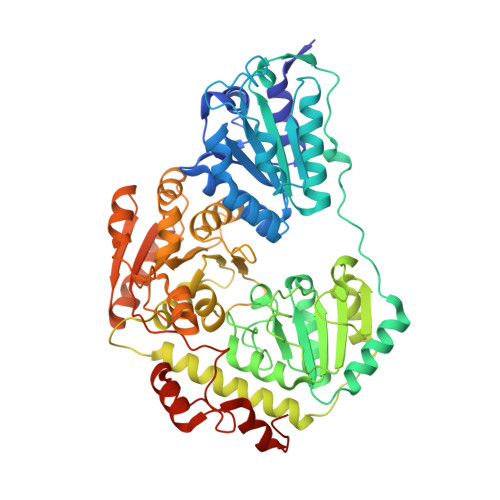Unexpected tautomeric equilibria of the carbanion-enamine intermediate in pyruvate oxidase highlight unrecognized chemical versatility of thiamin.
Meyer, D., Neumann, P., Koers, E., Sjuts, H., Ludtke, S., Sheldrick, G.M., Ficner, R., Tittmann, K.(2012) Proc Natl Acad Sci U S A 109: 10867-10872
- PubMed: 22730460
- DOI: https://doi.org/10.1073/pnas.1201280109
- Primary Citation of Related Structures:
4FEE, 4FEG - PubMed Abstract:
Thiamin diphosphate, the vitamin B1 coenzyme, plays critical roles in fundamental metabolic pathways that require acyl carbanion equivalents. Studies on chemical models and enzymes had suggested that these carbanions are resonance-stabilized as enamines. A crystal structure of this intermediate in pyruvate oxidase at 1.1?? resolution now challenges this paradigm by revealing that the enamine does not accumulate. Instead, the intermediate samples between the ketone and the carbanion both interlocked in a tautomeric equilibrium. Formation of the keto tautomer is associated with a loss of aromaticity of the cofactor. The alternate confinement of electrons to neighboring atoms rather than ¦Đ-conjugation seems to be of importance for the enzyme-catalyzed, redox-coupled acyl transfer to phosphate, which requires a dramatic inversion of polarity of the reacting substrate carbon in two subsequent catalytic steps. The ability to oscillate between a nucleophilic (carbanion) and an electrophilic (ketone) substrate center highlights a hitherto unrecognized versatility of the thiamin cofactor. It remains to be studied whether formation of the keto tautomer is a general feature of all thiamin enzymes, as it could provide for stable storage of the carbanion state, or whether this feature represents a specific trait of thiamin oxidases. In addition, the protonation state of the two-electron reduced flavin cofactor can be fully assigned, demonstrating the power of high-resolution cryocrystallography for elucidation of enzymatic mechanisms.
Organizational Affiliation:
Albrecht-von-Haller Institute and G?ttingen Center for Molecular Biosciences, D-37077 G?ttingen, Germany.






















